
 |
 |
11th Session of
the Commission on Sustainable Development
UN
Headquarters, New York, 28 April - 9 May 2003
|
Versión
en
Español |

| |
 |
CSD11 Highlights,
Tuesday, May 6th

Photo
above: Working Group 2 Panel
Delegates convened in two parallel working groups in the morning
and afternoon to continue negotiating the Chair’s draft
decision on the future programme, organization and methods of
work of the Commission. Working Group I discussed the section
of the draft decision on the future organization of work, while
Working Group II considered the sections on enhancing contributions
of the UN system and Major Groups. |

WORKING GROUP 1
 Throughout the day, participants
reviewed text, paragraph by paragraph, of the draft decision projected
on a large screen in the conference center.
Throughout the day, participants
reviewed text, paragraph by paragraph, of the draft decision projected
on a large screen in the conference center.
|
|
|
|
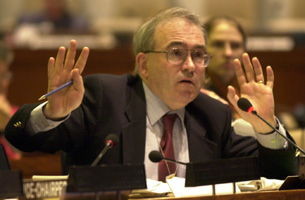
Richard
Ballhorn, DFAIT Canada
|
|
The
Working Group began a second reading of the Chair’s draft
decision, which had been revised in a compilation text to include
delegates’ suggestions from Monday.
The G-77/
CHINA said it preferred not to overload the initial paragraphs
with wording that could be included in the preamble, which has
yet to be introduced. Many delegates agreed that the Norwegian
reference to the CSD as a high-level forum for sustainable development
should be integrated in the first paragraph, which establishes
what the CSD’s organization of work should achieve. The
G-77/CHINA proposed adding “as appropriate” to text
proposed by the US on sharing best practices and on partnerships.
However, the US objected to this.
|
|
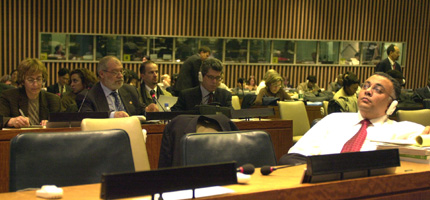
Delegates from the US
(on left) and Egypt (on right)
|
|
A
new paragraph proposed by the US on the two-year work cycle
was debated at length, with the EU, REPUBLIC OF KOREA, NORWAY
and RUSSIAN FEDERATION opposing use of the word “action”
to describe review and policy years.
The location and duration of CSD
sessions were also discussed, with SWITZERLAND, CANADA and NORWAY
voicing preference for them to occur “normally in New
York.” Several delegations objected to the REPUBLIC OF
KOREA’s proposal to restrict the CSD sessions to “not
more than one week".
|
WORKING
GROUP 2
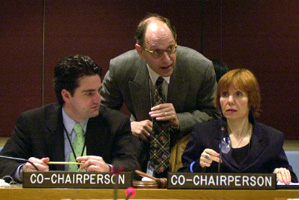
Working group
2 co-chairs Bruno Stagno (Costa Rica) and Irena Zubcevic (Croatia)
|
|
On Tuesday morning, delegates began discussing a compilation text
incorporating delegates’ amendments from the previous day.
ENHANCING
CONTRIBUTIONS OF THE UN SYSTEM: The US, supported by CANADA,
proposed deleting this section on the grounds that it added
nothing new and merely paraphrased the JPOI. However, the EU
and G-77/CHINA insisted on its retention. In a paragraph calling
on all relevant organizations, UN funds, programmes and regional
commissions, and financial institutions, to be actively involved
in the CSD’s work on the JPOI, the US proposed referring
to paragraph 140(a) of the JPOI, which addresses similar issues.
He also proposed deleting a list specifying further measures
to implement the JPOI. The EU suggested referring to all of
paragraph 140, rather than just 140(a).
|
|
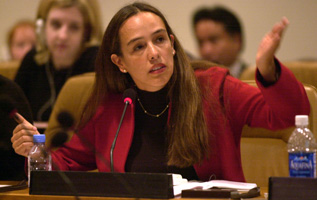
Delegate
from Mexico
|
|
MAJOR
GROUPS: Regarding the section on Major Groups, delegates agreed
to shorten the title to “Enhancing Contributions of Major
Groups.” On the chapeau of a paragraph deciding that contributions
from Major Groups should be further enhanced through a variety
of measures, the G-77/CHINA opposed a proposal supported by AUSTRALIA,
the US, EU and others to broaden the reference to include “other
relevant stakeholders.” There was also divergence over an
EU suggestion to refer to the “practices” as well
as the “rules of procedure” governing the participation
of Major Groups, with JAPAN, the US, G-77/CHINA, and others opposing
this addition.
|

G77/ China
|
|
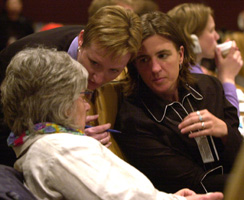
Canadian Delegates
|
|
On
the involvement of Major Groups in partnership-related and capacity
building activities, MEXICO suggested that the text should refer
to participation “at all levels.” The G-77/CHINA expressed
concern that this language could imply involvement at a high-level.
Delegates also agreed to a US proposal to mention “partnerships
fairs.” |
INFORMAL CONSULTATIONS ON SIDS
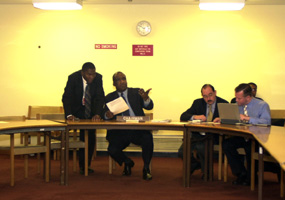
Facilitator
John Ashe
(second from the left, above)
|
|
An
informal consultation also took place in the morning to discuss
the draft decision on preparations for the international meeting
on the 10-year review of implementation of the Barbados Programme
of Action (BPOA) for the sustainable development of small island
developing States (SIDS). |
PARTNERSHIPS FAIR
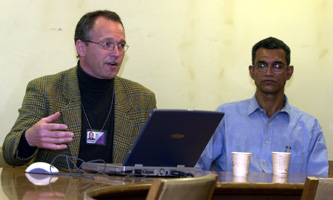
Soren Hermansen
(above left) and K. Raghavan (above right), Forum for Renewable
Energy Islands
|
|
100% Renewable Energy Islands-The Forum for Renewable Energy Islands
(FREI)
The main objective of this partnership/initiative, is to assist
island states to meet 100% of their energy requirements form Renewable
Energy Sources (RES) by helping htem with the preparation and
planning, organization and all the inputs (technical, financial
and managerial) required for implementation of the RES plan. By
helping SIDS to use 100% RES for their energy supply, this partnership
will result in: island states stopping the use of fossil fuel;
meeting their energy needs from locally available renewable sources
in a sustainable manner; and local manufacture of renewable energy
equipment creating employment and income generation leading to
poverty reduction. For more information, contact:
Soren Hermansen (Samso@sek.dk)
and K. Raghavan (kr3dk@yahoo.com)
|

Above,
left to right: Mark Radka, UNEP, and Daniel Bouille, Riso National
Laboratory
|
|
Global
Network for Sustainable Development (GNESD)- A Network
Facilitated by UNEP.
The GNESD is aimed at promoting sustainable development through
policies and solutions that expand access for the poor to environmentally
sound energy services. To accomplish this, GNESD is coordinating
joint activities to share information, undertaking analytical
studies and supporting policy development. For more information,
visit www.gnesd.org
|
|
|
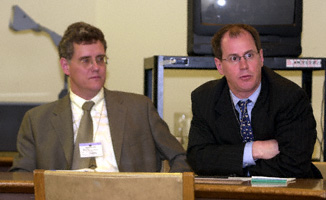
Peter
Lidiak, American Petroleum Institute (on left, above), and Rich
Kassel, NRDC (on right, above)
|
|
Clean
Fuels and Vehicles Partnership- organized by UNDESA/DSD, UNEP
and US EPA
The Partnership
for Clean Fuels and Vehicles aims to help reduce vehicular air
pollution in developing countries through the promotion of clean
fuels and vehicles, focusing initially on two priority areas:
the elimination of lead in gasoline and the phase down of sulphur
in diesel and gasoline fuels, concurrent with, the adoption
of cleaner vehicle technologies. Partners met in New York in
November 2002 to discuss and develop the implementation arrangements
for the Partnership. During this meeting Partners asked UNEP
to set up a Clearing-House at UNEP in Nairobi to help implement
the Partnership. For more information or to join the Partnership,
contact the Partnership Clearing-House:Rob de Jong (rob.jong@unep.org)
or Wendy Jackson (wendy.jackson@unep.org)
or visit the Partnership's website at www.unep.org/PCFV
|
SIDE EVENTS
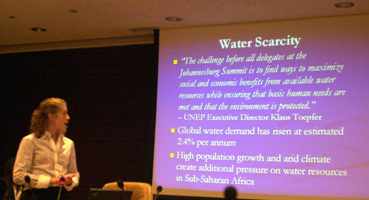
|
|
Princeton University Task Force on Sustainable Development,
organized by the Princeton Environmental Institute |
Global
Forum on Sustainable Energy, organized by the Government
of Austria

Left
to right: Elfriede Anna More, Austrian Ministry of Agriculture,
Forestry, Environment and Water Management, Werner Druml, Austrian
Ministry of Foreign Affairs, and Ambassador Irene Freudenschuss-Reichl
|
|
For more information, go to www.gfse.at |
|
The CSD and the GA Ad HocWorking Group on Conferences' Follow-Up,
organized by the International NGO Task Group on Legal and Institutional
Matters (INTGLIM) and Sustainable Development Issues Network
(SDIN)

(Left
to right): June Zeitlin, WEDO, Lori Henninger, Quaker UN Office,
???Croatia Vice-Chair, Nikhal Seth, UN Secretariat, DESA Policy
Coordination Unit, and Bill Pace, International NGO Task Group
on Legal and Institutional Matters (INTGLIM)
|
|
|
|
LEARNING CENTER
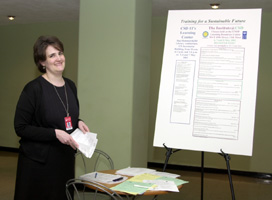
Andrea
Lauritzen, US Department of State
|
|
The Learning Center is being introduced on an experimental basis
to CSD-11 to further implementation of Agenda 21 and the WSSD
Plan of Implementation. The aim of the Learning Center is to
facilitate teaching/training at a practical level on various
aspects of sustainable development.
Training
Programme on Environmental Law: This programme provided
an overview of environmental law, and addressed key areas of
concern (air, water quality, solid and hazardous waste, natural
resources, endangered species and regulation of toxic substances),
and governance issues (the role of international, regional,
national, state and local enactments and authorities). The training
programme also addressed critical issues including transparency
and public involvement, environmental aspects of armed conflict
and energy and climate change.
|
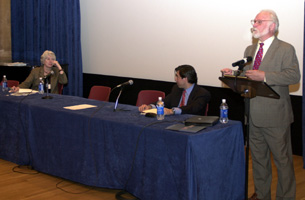
Ann Powers, Pace
University Law, Victor Tafur, The Pace Law School Energy Project,
and Jeff Miller, Associate Dean, Environmental Law Programme,
Pace University
|
|
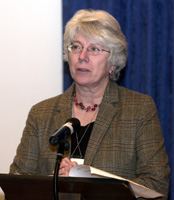
Ann
Powers, Pace University Law
|


Click here to see more of today's photos
Links
to further information:
.
|
Any irregularities on this page? Please
mail the Digital Editor
| Linkages
home | Visit IISDnet | Send
e-mail to ENB |
© 2003, IISD. All rights reserved.
|

